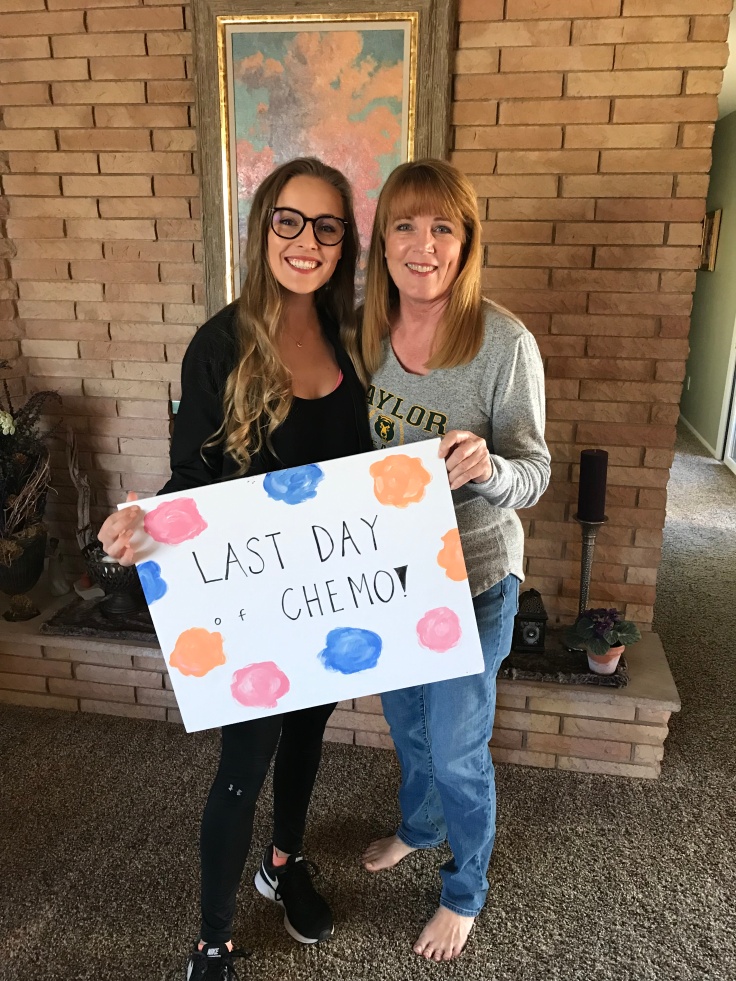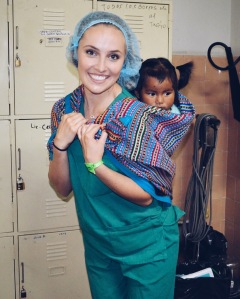Medical school is hard, I think that’s been fairly well-established. So when I started my first year of medical school, I was fully expecting late nights, jam-packed days, and based on the nearly universal analogy, I was expecting to be “drinking from a fire hydrant” for the next 4+ years. To some extent, those of us who voluntarily subject ourselves to this educational tract seem to thrive when we’re busy, so I was both ready and excited to start the next step of the journey.
What I wasn’t expecting, nor could I have been prepared for, was my mom’s stage IV follicular lymphoma diagnosis in the middle of my first quarter. My entire world up to that point, safe in the walls of academia and far from the harsh realities on the other side of medicine, crumbled.
At first, we didn’t know anything about her diagnosis, except that it was cancer, it had metastasized, and the primary tumor was massive and had wrapped around both her aorta and spine. We didn’t know what type of cancer it was, what staging it was, or what the prognosis was. I knew just enough from school to know it wasn’t good, but not enough to have any meaningful answers. Furthermore, this was all occurring inside the microcosm of medical academia that keeps going whether you’re ready or not, so I was left stumbling forward while trying to pick up all the pieces.
The balancing act I had been delicately juggling for the first few months of school toppled down, and I really didn’t know how to move forward, even if just a step. This month of waiting was by far the most difficult time for me, because not only did I feel like I couldn’t move forward, I didn’t have a context to help me process what was happening.
If this sounds familiar, I’m hoping this will at least give you a community and the comfort of knowing that you’re not alone, and at best helps you figure out your first step forward.
Realization 1: You are going to be okay. Maybe not great, and maybe not even good for the time being, but you are going to survive and you are going to keep moving forward, no matter how slowly.
I was able to schedule a therapy appointment the very next day, and after pouring my heart out and expressing all my fears, my therapist reminded me to be gentle with myself, to drink lots of water because crying really dehydrates you and makes you feel even worse, and to triage what I had to get done that night and what could wait a few days. This triaging became a key strategy throughout the next year.
Realization 2: There isn’t a perfect formula for how to move forward, so be gentle with yourself and give yourself space to grieve, sit in the discomfort, and process.
I made appointments the next day to speak with every single professor and let them know what was happening, because we were in the middle of midterms and I needed to know what flexibility I had with my courses. All of them (except 1) were incredibly supportive, and their compassion and support made me feel like I could continue with my studies, even in a crisis.
Realization 3: You do not need to drop everything because of a family member’s diagnosis, but if that’s what you think is best for you and your family, by all means do it.
If you take a leave of absence, what will you do? Will you stay home and worry, or will you be able to make a meaningful contribution? For me, the best choice was to stay in school.
Once we got the full diagnosis, her treatment plan involved chemotherapy for 2 full days, once a month. She scheduled her appointments on Thursdays and Fridays, so I was able to meet her at the oncology office after my morning classes, and watch movies/study with her over the weekends when she felt crummy. I feel incredibly thankful to have been in the same city as her, and if ending up at a medical school 25 minutes away from my parents’ house wasn’t divine intervention, I really don’t know what is.
Realization 4: Nothing about this situation is ideal, so just do your best to make it work.
Overall, my mom’s treatments were fairly smooth (although if you ask her, she may give you a different answer). Right before her last treatment, however, she was hospitalized for an unidentified infection, and that delayed the rest of her treatments. At this point, we had just started our third quarter, and we were slammed with labs, workshops, and exams. Her hospital was just a short drive on the highway from school, so as soon as the mandatory events were over, I was in the car driving to the hospital, and I learned the first physio and neuro exam’s material in a hospital room on the oncology floor.
Realization 5: You have to prioritize. Getting straight A’s? Romantic relationships? Being at every doctor’s appointment? Exercising and making time for self-care? You have to identify your priorities.
Personally, getting B’s in my courses was a sacrifice I was more than willing to make if it meant being with my mom during chemo, but I also didn’t hold myself to a standard of being at every single appointment. Basic self care was a non-negotiable. Identify your priorities, and continually remind yourself of them when you feel overwhelmed.
I felt a lot of guilt at first about choosing to go to the grocery store or on a run instead of studying for an extra hour. It was different than before the diagnosis, because grocery shopping and exercise seem reasonable in normal circumstances. But doing those things after you’ve already taken the whole afternoon off? If you take nothing else away from this, I hope it’s this: you are human first and foremost, and you must take care of yourself. I don’t know what that looks like to you, but identify any lingering shame and guilt around it and let it go. If you need someone to give you permission, I’m giving it to you right now.
Realization 6: Grief comes and goes as it pleases, and the emotional toll of a sick family member is high.
The emotional exhaustion was unbelievably real. When I wasn’t driving around, going to class, trying to take care of myself, or studying, I just wanted to sleep. And sometimes, sleep won over studying. Therapy was amazing for many reasons, but one that was especially important was helping me see the validity of how hard this situation was, even though its lack of tangibility made it difficult to appreciate at times. Having an ill loved one is hard. It sucks. It’s ok to rest because of emotional exhaustion.
Realization 7: Find your support system and lean into them, unabashed, when you need them.
My last thought for right now is the importance of a support system. Since we had just started school, my local support system was still in the “friendly acquaintance” stage, but it quickly matured into a solid group of friends that helped me pick up the random pieces I sporadically dropped throughout those months.
Multiple people would text me and remind me of miscellaneous deadlines and mandatory events, or sit in the library with me until late because I didn’t want to study alone.
Professors would email me and ask how I was doing, if I needed extra help for a workshop I missed, or what the results of my mom’s most recent PET scans were.
The doctors at the clinic where I volunteer prayed faithfully for me and my family.
My best friend from childhood met me whenever I needed her, and gently told me I was going to be alright no less than 100 times.
My then-boyfriend, now fiancee, gracefully stepped into his new role of long-distance-supporter/emotional cheerleader/life partner, and was so patient and compassionate through the hectic schedules, emotional roller-coasters, and late-night phone calls.
For those of you who rallied behind both me and my family, thank you.
For those of you in a similar situation, you are going to get through this. One day at a time, or if that’s too much, one hour at a time or even one moment at a time. I promise.













Great commentary from a very personal perspective. My family has had a similar experience so I can attest to the value of every point you make. It is of utmost importance to take care of yourself because you must be in good shape to even begin caring for the loved one who is ill.
LikeLike
This is beautiful, you and your mother are such strong people and deserve all the happiness in the world. Keep thriving!
LikeLike
Thank you for sharing this. ❤ Medical school is tough on its own, let alone having a parent be sick at the same time. Your willingness to share your insights and journey are invaluable.
LikeLike